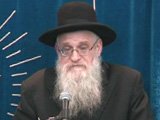Beit Midrash
- Shabbat and Holidays
- Rosh Hashana
- The Essence of Rosh Hashana
Festive Clothing and Food on Rosh Hashana, the New Year
The Shulchan Aruch brings down the Halacha, that notwithstanding all the fear and trembling associated with the Day of Judgement, we prepare for Rosh HaShana like we do for a festival; for instance, we launder our clothing and get haircuts. One could understandably think, to the contrary, that we should behave like mourners out of fear of the judgement; but since we are certain that G-d will judge us righteously, we treat Rosh Hashana as a festival. As our Sages say in the words of Rabbi Chanina and Rabbi Yehoshua: "Which nation is like this nation, that knows the character of its G-d. For the majority of mankind, a man about to be put on trial wears black and neglects his appearance because he doesn't know what the verdict will be. But not so with the nation of Israel: they get haircuts and groom themselves beforehand and they wear white clothing and eat and drink on Rosh Hashana, since they know that G-d will perform a miracle for them" (Tur Orach Chaim).
The Words of the Sh'lah HaKadosh
The Sh'lah HaKadosh asks (Masechet Rosh HaShana, Torah Ohr), how can we be sure that a miracle will happen and we will be judged favorably? We see with our own eyes that every year people die and others suffer from diseases, meaning that no miracle occurred for them; if so, why are we certain that G-d will perform a miracle for us on Rosh HaShana?
The Sh'lah answers, that everyone who stands before the Holy One, Blessed be He on Rosh HaShana in prayer, and performs Tshuva (repentance), is assured that He will judge him favorably. However, in certain cases, because of the world's imperfections and sins, G-d sees that it is better for someone that he should die, and since that is so, he should also rejoice on Rosh HaShana, since by virtue of his prayer and Tshuva, the Holy One will judge him in the manner that is the best and most appropriate for him.
The Seudot (Festive Meals) of Rosh HaShana
The prophet Nechemiah (8:1) said to the Jewish People after the prayer of Rosh HaShana: " Go eat hearty food and drink sweet drink...for this is a holy day to our Lord; and be not sad, as rejoicing in G-d is your strength".
And this is the Halacha, that we must eat and drink and rejoice on Rosh HaShana, and we are forbidden to fast on this day. Nonetheless, one shouldn't (go to the other extreme) and fill his belly and gorge himself on Rosh HaShana since one must maintain his fear of G-d and not become lighthearted (Shulchan Aruch).
The same is true in regard to clothing: Even though we should wear white, festive clothing, the Turei Zahav wrote in the name of the Rashal that we shouldn't wear luxurious silk or embroidered garments in the manner we wear them on other Festivals. This is in order that the fear of the judgement should remain upon us (Mishna Berura).

The Festivals of Tishrei and the Sanctity of Israel
Rabbi Yehoshua Magnes | Monday, 5 Tishrei 5768

The Musaf of Rosh HaShanah
Rabbi Yirmiyohu Kaganoff | Elul 5768



















